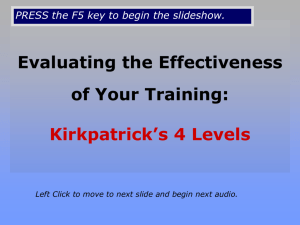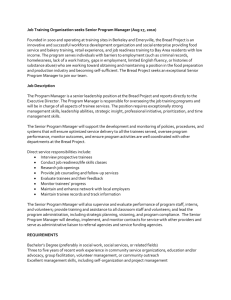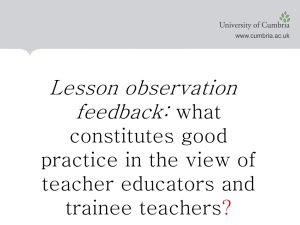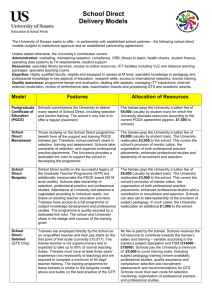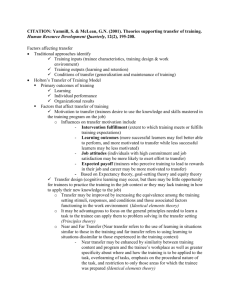Kathy Wright - 28 Feb Presentation
advertisement
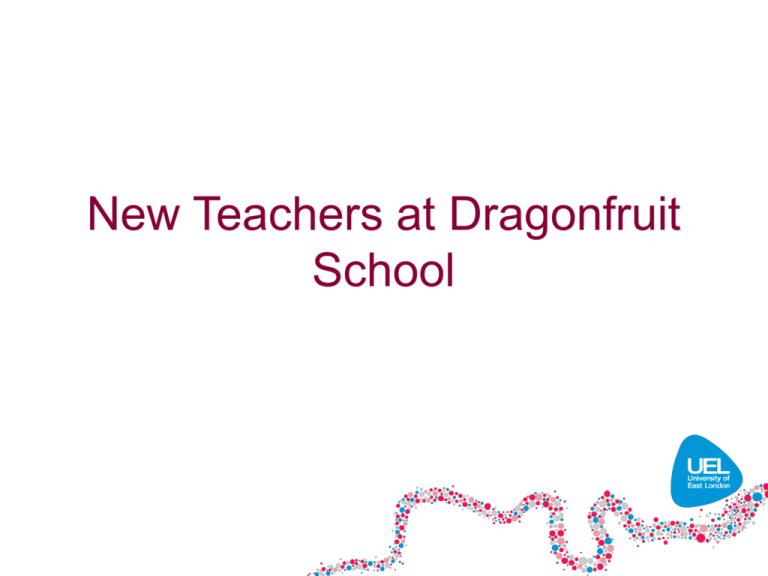
New Teachers at Dragonfruit School Preparing New Secondary Trainee Teachers for 21st Century Learning Our Learners: 250 Secondary Trainee Teachers in 11 Specialist areas (on GTP/PGCE) Most of our trainees: Have an online social life Manage online networks Share photos Are collaborative and creative online Play, shop, entertain and are entertained Multi-task on line and expect speed and sophistication However.... Despite the use of Web 2.0 for social interactions, Use Web 1.0 for learning purposes Never had online learning modelled for them Want ‘learning’ in one place, one click away! Will Richardson (2010): ‘In order for us to prepare our students for what is without question, a future filled with networked learning spaces, we must first experience those environments for ourselves.’ Our Starting Point – PreCourse Workspace Our Use of New Media so far Our Pre–Course Workspace (wiki) so far... Where did we do this? Adding Comments Arrivals Lounge, Forum and many other pages Writing on a page My Best Teacher, Debate, Sand Box pages Inserting images, plug ins etc Sand Box pages Creating new Pages Sand Box pages Linking pages to ‘home’ page. Thinking of design and effective communication using social media Sand Box pages Other Tools Other Tools: Wordle My Best Teacher Word Picture (and presentation posted on learner use of Wordle) Surveymonkey Voting on Debate Wallwisher ‘Game Changer activity’ Microblogging – 160 character limit. (Also created by trainees themselves) Voki On Wallwisher page - Mini podcast using own voice or avatar voice Podcast Our Start with new technologies in learning with PowerPoint to go with podcast Diigo – RE group using for social bookmarking. Take a look as this could be useful to other subject groups for sharing interesting articles/web pages etc. Can you explain why you may or may not use collaborative technology in your professional practice? I think using this sort of technology is brilliant. I've never done it before but have really enjoyed it and can see the benefits of it both in classroom and in work in general. (a) Makes you look clever (b) Adds flavour to teaching (c) I think that podcasts are a great way of imparting small pieces of information. You can get your point over without boring people to tears. Little and often - that's the way. Very efficient tool for group work - very much more so than face to face meetings which eat up as much time as you throw at them and are often less productive. Also meetings post-wiki discussion are more focussed and informed, and decisions can be made relatively painlessly. it's kinda cool ‘I can see how this could be used as an effective tool for collaboration on different projects that I may want to set students over a term or holiday period. It could also be an effective way of communicating in a very busy school environment and I like the idea of allowing pupils to have some sort of control over when they chose to study. This means that instead of the traditional face to face meetings which can cause problems with timetabling, I feel that this approach allows everyone to contribute to a particular project in a timescale that is convenient to them. This would work well especially in year 9 to 11 when there is more pressure on students to get home work, course work and revision done.’ The counter arguments..... ‘I believe the notion of a VLE inside schools in seen as an exciting new development, but I'm not sure why. I'm also not sure that it will produce the kind of improved flow of constructive interaction that is assumed to be its benefit. So I expect to fit in with whatever other staff members are keen to do, but probably not taking too many initiatives myself. Possibly I will use it more with some staff members than others, when I see which ones like it and which do not. It could just become a way of doubling our workloads to no good purpose.’ ‘(In schools), we do not have the facilities in place.’ ‘Resistance from other more conservative, less progressive teachers.’ What makes for an ‘educated’ st 21 learner? ‘Learners need skills that go far beyond reading, memorisation and communication. Educational institutions have an obligation to help students cultivate those skills that learners have the most difficulty attaining on their own, such as: 1. judgement, or the ability to distinguish the reliable from unreliable information 2. synthesis, or the capacity to follow the longer argument or narrative across multiple modalities 3. research, or the activity of searching, discovering, and disseminating relevant information in a credible manner 4. practice, or the opportunity to learn-bydoing within authentic disciplinary communities 5. negotiation, or the flexibility to work across disciplinary and cultural boundaries to generate innovative, alternative solutions.’ Becta, Emerging technologies for learning Volume 3 (2008) p21 UEL Secondary ITT On Course..... ...the Virtual Schools Project (since 2007) Focus Group Trainee (Nov 2007): ‘It's helped me, practically, because I'm in a school where there's 75% um EAL erm and like, literally every class has got at least one person, with um, who, who's either, can understand spoken English but can't read or write um very well and er it's just like gave me a lot of ideas to use in my lessons ...... ‘ EP Deputy Head and PCM at partner school who hosted VS visits: ‘By introducing and developing virtual schools and getting trainees to think outside their subject area about how schools are run and what kind of issues they face, UEL has been innovative in this field. She has equipped the trainee's with skills and knowledge that go far beyond the usual run of the mill PGCE course.’ Marsha from 2007-8 ML cohort e-mailed last year: ‘I am writing to share with you the news that I have been promoted as an ICT leader for MFL and Foundation subjects. I would like to thank you for giving me the opportunity to develop my ICT skills and knowledge during my PGCE at UEL. Both UEL+ (our VLE) and virtual schools (on the WIKI) were fantastic e-learning media which gave me a head start.’ 2008-9 Validated a M level module on New & Emerging Technologies as part of our new Post Graduate offer to be implemented in 2009-10 for the first time. End of year survey a resounding ‘no’ to assessing the Virtual School work 2009-2010 We started ‘assessing’ Virtual Schools Immediate impact on quality of work, both creative and research, an impact on enhanced IT capability of all trainees. CEOP ‘thinkuknow’ training for all trainees. Start running N&ET module – project around which assignment based had to be a plan as couldn’t guarantee trainees would have the opportunity to ‘deliver’ collaborative blended learning. Confirmed in module discussions. Very little modelling in schools. Assessed Virtual Schools Work Quotes from posting on last year’s N&ET module: ‘My school cannot even install and run Adobe CS4 correctly (purchased before Christmas and urgently required!)’ ‘We have no LMS/VLE and Web 2.0 technology is mostly blocked.’ ‘My head has asked me to report to SMT on VLEs when I return from my second placement next week as I have researched and implemented an LMS in my previous life. He wants a VLE in place for September. Whether this is possible with both systems and staff constraints, I'm not sure...’ ‘The main reason why technology isn’t more used in schools generally, and in this particular case Web 2.0, is that teachers do not have the time to properly investigate and practice these new technologies. They then do not feel comfortable coming to class unprepared particularly on a topic which they know their pupils almost certainly are more comfortable. I’ve turned that dynamic around a little bit. I welcome opportunities for pupils to help me solve any technological issues that arise – of course, one must be prepared as a teacher but allowing the pupils a chance to shine and acknowledging that you don’t know EVERYTHING is positive I think. Modelling what to do when you don’t know something (ask for help and accept it graciously) is also a good thing. Another overall point is that generally the further up the school’s hierarchy you go, the less comfort with technology you find. Therefore senior leadership teams are often the barriers rather than the leaders on this issue.’ .....I know a lot of people who were scared of the UEL induction Wiki but again, once you’re forced to participate, you realise how easy it is and you go back for more. Therefore, some initiatives or programmes that forced all teachers at a school, particularly senior management to engage with Web 2.0 might be all that is needed to overcome this fear and reluctance. 2. All teachers in my school use the web for resources and are comfortable with Web 1.0 and find these resources (and the time-saving they confer) great. However, most of them have never heard of Wikis, don’t believe they could set up a blog and don’t engage with interactive websites generally. This alone is the main reason they don’t use Web 2.0 – there is a lack of familiarity with how easy it is to use. ‘ Next Steps 2010-11: •‘3 dimensional’ Virtual Schools •Collaborative evaluation of technologies •Personal Project Plan for all trainees •CEOP E-Safety Training for all •DfE Vital E-Copyright course offered to all trainees 2010 - 2011 Pre-Course Workspace with much more interactivity but also going beyond wikis – Wordle, Voki, Diigo, widgets, podcasts... Enhanced VS Project with strengthened focus on technology – loan of flip cameras, MP3 recorders, collaborative evaluations of different technologies, use of Yammer... Compulsory assessed plan for pupil activity using a technology Increased numbers doing M level module (14 last year up to around 100 this year). Next year all PGCEs will do it!! Is it having a bigger impact? •On Trainees? •On Mentors? • and therefore the Pupils? Impact on Virtual Schools 2010 250 Personal Project Plans Some even tried them out ..... or will try them out Tom Malins, Secondary PGCE PE Programme Impact on Pupils • • • • • • Motivation for engaged learning. Increased use of ICT including wiki pages, cameras and video recorders. Optional extra-curricular work (e.g. session plans online). Team work. Collaborative working. Greater involvement with the learning. Impact on the Teachers • Introduction to wiki pages. • Learning how to use wiki pages within Physical Education. • Implementing their own unit of work using wiki pages. Dark Clouds on the Horizon? Policy hiatus? Government focus on ‘traditional curriculum’? Ofsted inspection focii? Budget cuts? Future of HE led teacher training Potential impacts on the future? Elsewhere in the World In North America - USA – powered up learning - New Brunswick, Canada In Conclusion: Keep the Faith... Gather and start disseminating the evidence on the impact on all learners ‘Being net savvy – or not – is no longer an option. It is an imperative in the age of information.’ Diana Oblinger (2007). ‘Becoming Net Savvy.’ EDUCAUSE Quarterly 30(3): 11–13. http://www.educause.edu/ir/library/pdf/eqm0731.pdf
